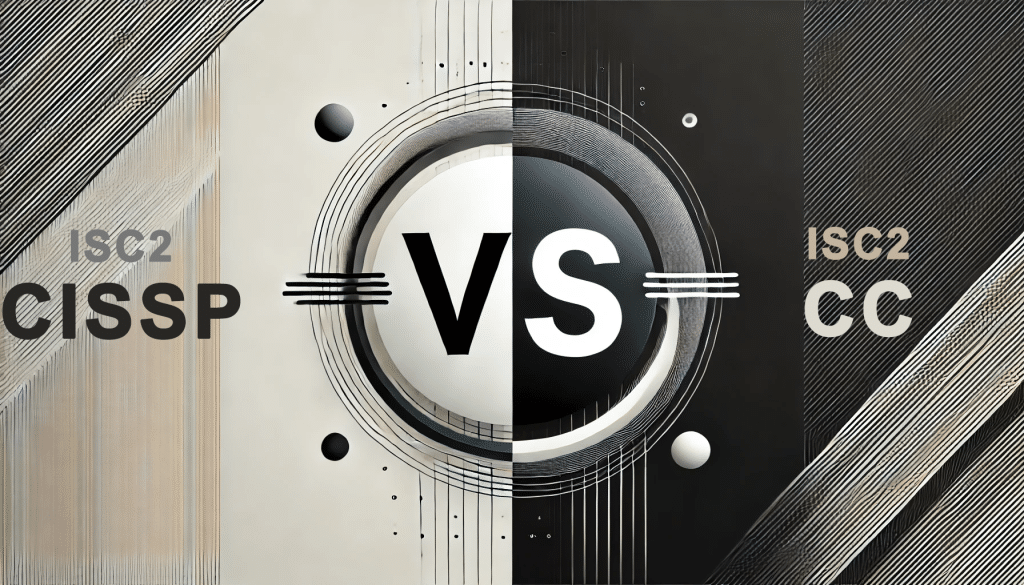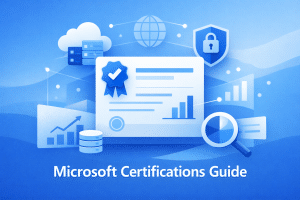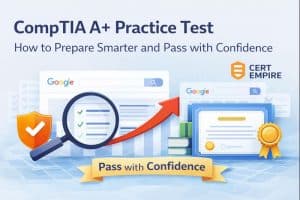Thinking about getting into cybersecurity or leveling up your career? Choosing the right certification can feel overwhelming, especially with options like ISC2 CC and CISSP on the table. Both are well-known and can boost your career, but they serve different purposes. Whether you’re just starting or have years of experience, it’s important to know which one fits your goals best.
Some people look for an entry point into cybersecurity, while others aim for higher-level roles that require deeper knowledge and experience. That’s where the ISC2 CC and CISSP come in; one is great for beginners, and the other is designed for experienced professionals.
So, how do you know which one certification is right for you? Let’s break it down and find out which certification matches your career path, skills, and future plans.
Comparison!
| Aspect | ISC2 CC | CISSP |
| Overview | An entry-level cybersecurity certification focusing on key concepts and security fundamentals. | An advanced-level certification that demonstrates a deep understanding of a wide range of security domains. |
| Target Audience | Newcomers to the cybersecurity field and those seeking foundational knowledge. | Experienced professionals, managers, and executives in cybersecurity roles. |
| Focus Areas | Security Principles Cybersecurity Terminology Risk Management Security Policies | Security and Risk Management Asset Security Security Engineering Identity and Access Management (IAM)Security Operations |
| Prerequisites | No formal prerequisites; basic understanding of IT and cybersecurity concepts recommended. | 5 years of work experience in at least two of the eight CISSP domains. |
| Domains Covered | Security Foundations Risk Management Security Governance | Security and Risk Management Asset Security Security Architecture and Engineering Identity and Access Management (IAM)Security Operations Software Development Security |
| Exam Length | 100 questions; 2 hours. | Up to 175 questions; 4 hours. |
| Exam Format | Multiple-choice questions. | Multiple-choice and advanced innovative questions. |
| Exam Fee | $249 (USD). | $749 (USD). |
| Certification Maintenance | Valid for 3 years; requires continuing professional education (CPE) credits. | Valid for 3 years; requires 120 CPEs (Continuing Professional Education credits). |
| Difficulty Level | Moderate; suitable for individuals looking to start their cybersecurity career. | High; requires deep technical knowledge and significant experience in security management. |
| Industry Recognition | Gaining recognition for professionals entering the cybersecurity field. | Widely regarded as one of the top certifications in the cybersecurity industry. |
| Job Roles | Cybersecurity Analyst Security Consultant IT Security Administrator | Security Architect Chief Information Security Officer (CISO)Security Manager |
| Salary Impact | Entry-level salary range ($50,000–$85,000 annually). | High salary potential ($100,000–$150,000+ annually). |
| Ideal For | Individuals looking to start their cybersecurity career and gain foundational knowledge. | Experienced professionals aiming to advance their career in senior security roles or leadership positions. |
| Vendor | ISC2 | ISC2 |
Diving into ISC2 CC – What’s It All About?
The ISC2 Certified in Cybersecurity (CC) is a good way to step into the network security field without feeling overwhelmed. It’s made for people who want to understand the basics of cybersecurity and get a recognized cert to prove it. Whether you’re switching from another IT role or just starting out, ISC2 CC helps build a strong base without needing years of experience.
The ISC2 Certified in Cybersecurity (CC) exam might be your perfect starting point. It’s designed to give beginners a way to break into the field without needing years of experience.
Who Is It For?
If you’re wondering whether ISC2 CC fits your profile, it’s pretty simple. It’s aimed at beginners, those who might have some tech knowledge but no formal cybersecurity experience. Maybe you’ve been working in IT support, networking, or another tech-related area and want to add cybersecurity skills to your toolkit. This cert is also great for students, career changers, or anyone looking to break into the field without jumping straight into advanced certs like CISSP.
Unlike other cybersecurity certs that expect years of experience, ISC2 CC is open to anyone. You don’t need to have a long history in IT or a list of previous certs. It’s a starting point, plain and simple. If you’ve been thinking about cybersecurity but felt unsure about where to begin, this cert can clear things up and help you figure out if it’s the right path for you.
Plus, it connects you to ISC2’s other certifications, opening up future growth opportunities like CISSP and SSCP. To dig deeper, check out our guide on how to pass the ISC2 CC exam with smart preparation strategies.
What’s Covered in the Exam?
The exam focuses on basic but important areas of cybersecurity. It’s designed to test whether you understand the key concepts that every security professional should know. The topics aren’t too deep, but they cover enough ground to make sure you’re ready for an entry-level role.
Here’s what you can expect to see on the exam:
- Security Principles: The basics of how to protect systems and data, including the importance of confidentiality, integrity, and availability.
- Business Continuity and Disaster Recovery: How organizations stay prepared for unexpected events and keep their operations running smoothly.
- Network Security: Understanding how networks are structured, common threats, and ways to protect data as it moves across networks.
- Access Controls: How systems verify users and restrict access to sensitive information.
- Security Operations: The daily tasks that cybersecurity teams handle to monitor, detect, and respond to threats.
- Risk Management: Identifying potential security risks and figuring out how to reduce them.
The exam isn’t loaded with deep technical questions. Instead, it checks your general understanding of these areas, ensuring you have a solid grasp of the fundamentals.
For a detailed career outlook and salary expectations, you can explore our analysis of ISC2 CC job roles and salary insights.
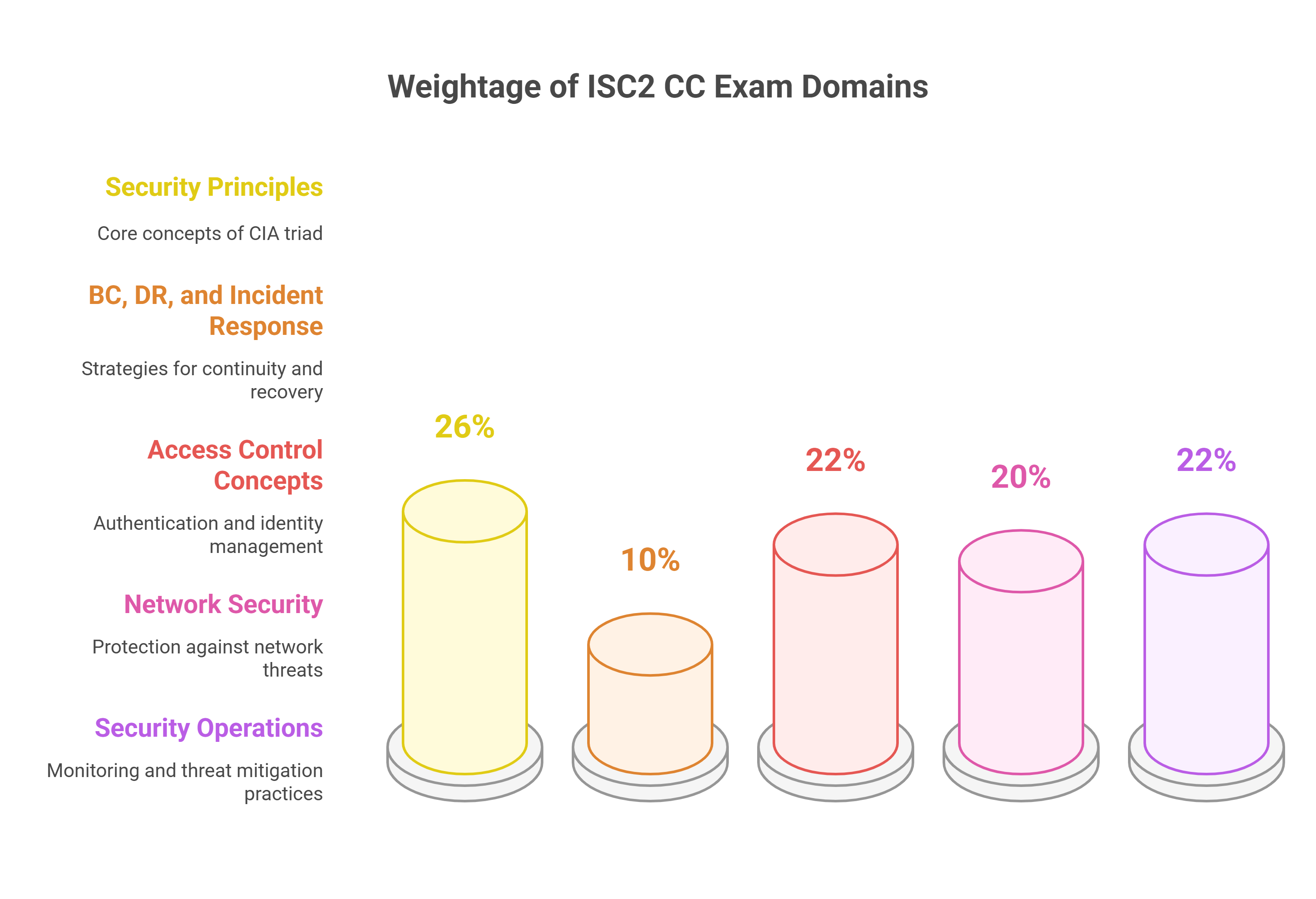
ISC2 CC Exam Format and Requirements
The ISC2 CC exam is designed to assess fundamental cybersecurity knowledge in a straightforward way, but that doesn’t mean it’s something you can take lightly. While it’s not as complex as advanced certs like CISSP, you still need to be well-prepared to pass. The format is simpler, making it a good starting point for those new to cybersecurity.
Here’s what to expect when sitting for the ISC2 CC exam:
- Number of Questions: 100 multiple-choice questions
- Time Limit: 2 hours
- Passing Score: 700 out of 1000
- Format: Fixed-form exam, meaning the questions are pre-set and don’t change based on how well you’re doing.
Unlike CISSP, ISC2 CC doesn’t use adaptive testing, so you get a fixed set of questions covering different areas of cybersecurity. The questions are mostly straightforward, focusing on testing your understanding of core network security principles, but some may require applying knowledge to real-world situations.
Getting to Know CISSP – What You Should Expect
CISSP (Certified Information Systems Security Professional) is one of the most recognized cybersecurity certs out there. It’s often seen as the gold standard for professionals who want to take their careers to the next level. But it’s not for everyone. If you’re thinking about going for it, you need to know what it takes, what’s covered in the exam, and how to prepare without feeling overwhelmed.
Who Should Go for CISSP?
This cert isn’t aimed at beginners. It’s built for experienced cybersecurity pros who already know their way around security concepts and have been interested in working in the field for a while. If you’re in a role where you’re handling security policies, designing security structures, or making important decisions that impact an organization’s security, then CISSP is worth considering.
People who usually go for CISSP include:
- Security analysts looking to move into leadership roles.
- IT managers who want to strengthen their security knowledge.
- Security consultants who need a solid credential to prove their expertise.
- Network engineers aiming to specialize in security strategies.
- Chief Information Security Officers (CISOs) or those aiming for such roles.
If you’re still new to cybersecurity, this cert might be too much right now. ISC2 requires at least five years of relevant experience in at least two years or more of the exam’s eight domains. Without that experience, you’ll still get credit for passing the exam, but you’ll be labeled as an “Associate of ISC2” until you meet the experience requirement.
What’s Covered in the CISSP Exam?
CISSP isn’t just about learning security concepts, it’s about applying them in real-world situations. The exam tests your ability to manage, design, and oversee security programs across different industries.
The content is split into eight content domains, each focusing on a critical area of cybersecurity.
- Security and Risk Management – Covers legal, regulatory, and compliance topics, along with security governance and policies.
- Asset Security – Focuses on handling data and ensuring information stays protected throughout its lifecycle.
- Security Architecture and Engineering – Deals with designing and implementing secure IT systems, including encryption and cloud security.
- Communication and Network Security – Involves securing networks, protocols, and data transfer methods.
- Identity and Access Management (IAM) – Focuses on controlling access to systems and ensuring users have the right permissions.
- Security Assessment and Testing – Covers evaluating security systems through audits and vulnerability assessments.
- Security Operations – Looks at day-to-day security processes, including monitoring, incident response, and disaster recovery.
- Software Development Security – Focuses on integrating security practices into software development processes.
Each domain carries a different weight in the exam, with Security and Risk Management being the heaviest. The exam is designed to see how well you can think critically and apply security concepts, not just memorize facts.
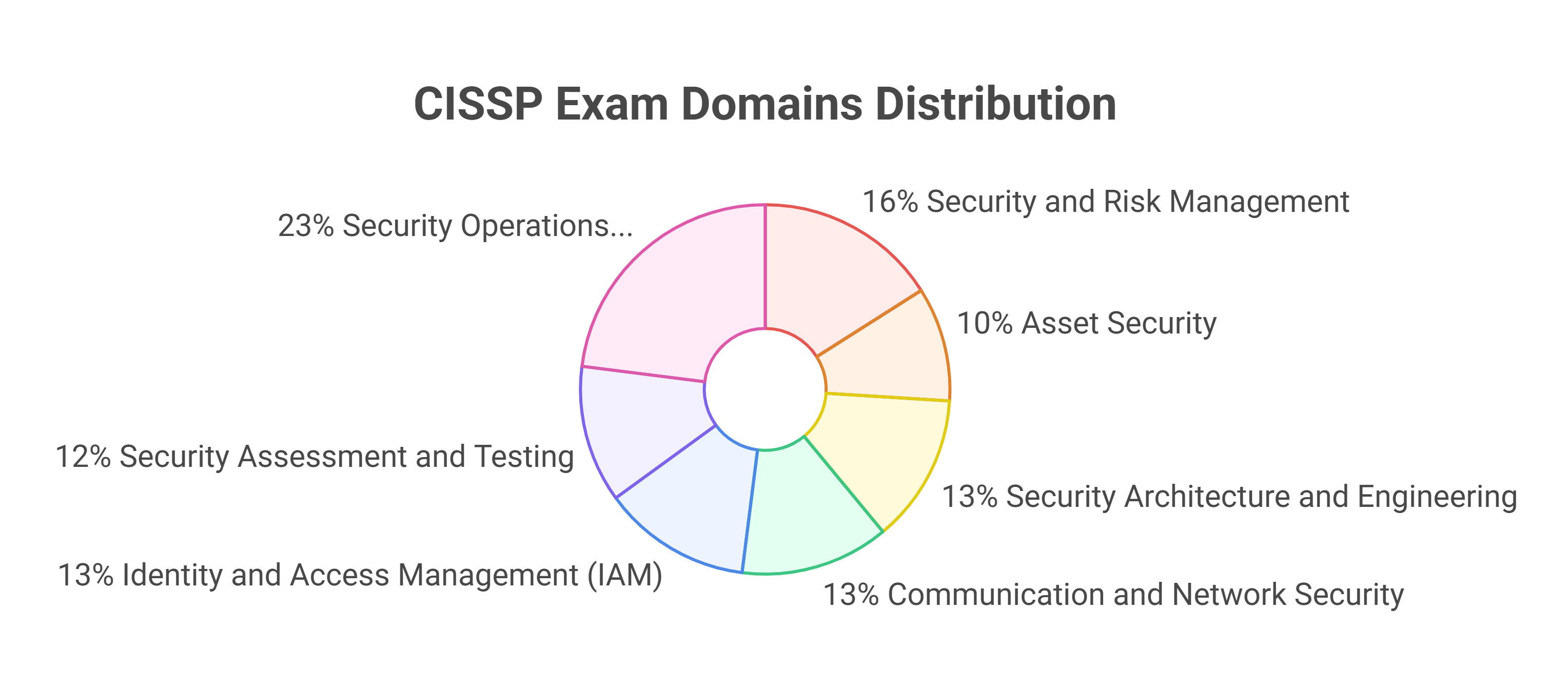
Exam Format and Requirements
The CISSP exam isn’t something you can breeze through. It’s tough, and the format itself can be challenging.
- Number of Questions: 125–175 (adaptive testing)
- Time Limit: 4 hours
- Passing Score: 700 out of 1000
- Format: Computerized Adaptive Testing (CAT), meaning the questions adjust based on your performance. If you get a question right, the next one might be harder; if you miss one, the next might be easier.
One thing to keep in mind is that the exam doesn’t just test knowledge, it measures how well you can apply it in practical scenarios. Many of the questions are scenario-based, which means you need to think through real-world problems and choose the best solution.
Once you pass, you’ll need to commit to continuing education and professional development opportunities. CISSP holders are required to earn 120 Continuing Professional Education (CPE) credits every three years and pay an annual maintenance fee.
How Adaptive Testing Impacts Your Performance
The biggest difference in exam experience comes from CISSP’s adaptive testing method. Adaptive exams can be challenging because:
- Question Difficulty Changes: Each correct answer raises the difficulty, meaning you could end up with increasingly complex questions that require deeper thinking.
- No Going Back: In CISSP’s CAT format, once you submit an answer, you can’t revisit it later, so careful reading and decision-making are crucial.
- Shorter Exam Duration: Since the test adapts to your skill level, it may finish earlier than the maximum allowed time, which can be an advantage if you’re well-prepared.
In contrast, ISC2 CC’s fixed format allows more flexibility. You can answer questions in any order, revisit flagged questions, and manage your time based on your comfort. This makes it easier to plan your approach and reduce anxiety compared to the adaptive model of CISSP.
Choosing Based on Exam Structure
If you’re someone who prefers a more traditional test format where you can review answers and adjust your approach, ISC2 CC is a good starting point. However, if you’re ready for a tougher challenge and have the required experience, CISSP’s adaptive testing method offers a more dynamic way to prove your skills, but it requires strong focus and confidence in each answer.
Understanding these differences can help you prepare better and choose the exam that aligns with your comfort level and career goals.
Difficulty Levels and Preparation Time – What to Expect
When comparing ISC2 CC and CISSP, the difficulty levels are worlds apart. One is designed to introduce you to the cybersecurity field, while the other is meant to challenge seasoned professionals. Knowing what you’re up against can help you decide which cert fits your current skill level and how much time you need to prepare effectively.
ISC2 CC – A Manageable Start for Beginners
The ISC2 CC exam is considered beginner-friendly. It covers fundamental cybersecurity concepts without going too deep into technical complexities. The questions are straightforward, mostly testing your understanding of key principles rather than asking for hands-on experience. However, that doesn’t mean it’s a walk in the park, if you’re completely new to cybersecurity, you’ll need to put in some effort to grasp the material.
The exam covers a wide range of topics but at an introductory level, making it more accessible to those with little to no experience. The challenge lies in getting familiar with cybersecurity terminology and understanding basic concepts, such as risk management, network security, and access controls.
If you have a background in IT, you might find the ISC2 CC exam relatively easy, but for complete beginners, it could require more effort to get up to speed.
CISSP – A Tough Test for Experienced Pros
CISSP, on the other hand, is widely known for its difficulty. It’s not just about technical knowledge, it tests your ability to apply security concepts in real-world scenarios. The questions are often scenario-based, requiring a deep understanding of security principles and the ability to make informed decisions under pressure.
The difficulty comes from the sheer breadth of topics covered across eight domains, ranging from security governance and risk management to cryptography and software security. It’s not enough to memorize definitions, you need to understand how different security measures interact and how they impact an organization’s overall security posture.
Another factor that makes CISSP tough is the adaptive testing format. The questions get harder as you answer correctly, forcing you to stay sharp throughout the exam. Plus, once you submit an answer, there’s no going back, which adds to the pressure.
Security+ is especially popular among professionals who need to meet government and compliance standards. For an in-depth preparation roadmap, explore our ultimate SY0-701 exam preparation guide.
Typical Preparation Timelines Based on Experience
For ISC2 CC:
How long you need to prepare for ISC2 CC depends on your background.
- If you’re completely new to cybersecurity: Expect to spend 6-8 weeks studying, assuming you dedicate a few hours each week. You’ll need to cover all topics from scratch and take practice tests to get comfortable with the exam format.
- If you have some IT experience: 3-4 weeks of study should be enough. With existing knowledge of networking or IT security concepts, you’ll mostly need to focus on filling any gaps and getting used to ISC2’s way of asking questions.
- If you’re already in a cybersecurity-related role: You might only need 1-2 weeks of focused review to brush up on key areas and get familiar with the exam structure.
Most candidates find that preparing with official ISC2 study materials, online courses, and practice tests is enough to pass the exam without too much stress.
For CISSP:
CISSP requires a serious time commitment, often stretching across several months.
- If you have 5+ years of security experience: You’ll likely need 3-4 months of structured study, focusing on brushing up on weaker areas and practicing exam questions to get used to the CISSP-style scenarios.
- If you’re transitioning from IT into security: Plan for 5-6 months of intense preparation. CISSP covers a lot of ground, so you’ll need to spend time learning concepts that might not be familiar, such as risk management frameworks and compliance regulations.
- If you’re completely new but determined: It’s possible to pass CISSP without prior hands-on experience, but you’ll need at least 6-9 months of study. Breaking down the content into manageable chunks and taking multiple practice exams is key.
Many CISSP candidates follow a structured study plan, often combining official ISC2 resources with third-party books, online bootcamps, and practice tests. Study groups can also be helpful, as discussing complex concepts with others makes them easier to grasp.
Which Exam Suits Your Learning Style?
- If you prefer a straightforward approach and want to learn cybersecurity at a steady pace, ISC2 CC is the better choice. The topics are clear-cut, and with the right preparation, you can pass without too much stress.
- If you’re up for a challenge and enjoy deep-diving into security concepts, CISSP will push your limits. It requires not just study time but also critical thinking and the ability to apply what you’ve learned to real-world situations.
Cost Breakdown – What’s the Investment Like?
When considering ISC2 CC or CISSP, it’s important to look beyond just the exam fees. The overall cost includes study materials, training, and renewal fees, which can add up over time. Whether you’re on a budget or ready to invest heavily in your career, understanding the financial side can help you make the right decision.
ISC2 CC Cost Overview
1. Exam Fee:
The ISC2 CC exam is relatively affordable compared to other cybersecurity certs. The exam fee is $199 USD, making it a budget-friendly option for beginners or those testing the waters in cybersecurity. ISC2 also offers a free exam voucher when you sign up for their free self-paced training, which can help save on costs.
2. Study Material Costs:
You can get by with free resources if you’re willing to put in the effort, but some paid materials can make your prep easier. Estimated costs include:
- Official ISC2 Training (Self-Paced): Free with exam registration
- Books and Study Guides: $50 – $100
- Practice Tests: $30 – $80 (depending on the provider)
- Online Courses (Udemy, LinkedIn Learning, etc.): $20 – $150
- Bootcamps (Instructor-Led): $500 – $1,000 (optional, not necessary for most candidates)
3. Renewal Fees:
Once you pass the ISC2 CC exam, you’ll need to maintain your cert. ISC2 requires an annual maintenance fee of $50, which is lower than CISSP. You’ll also need to earn Continuing Professional Education (CPE) credits to keep your cert active, but these can often be earned for free through webinars and online resources.
Total Estimated Investment for ISC2 CC:
If you opt for self-study, the total cost can be as low as $200-$300, but if you prefer structured courses and additional resources, it might go up to $500-$1,000.
CISSP Cost Overview
1. Exam Fee:
CISSP is more expensive, reflecting its advanced level. The exam fee is $749 USD, which is a significant investment for many professionals. Some candidates may also need to pay additional fees for rescheduling or retaking the exam.
2. Study Material Costs:
Due to the complexity of the exam, most candidates invest in multiple resources. Some cost estimates include:
- Official ISC2 CISSP Study Guide: $80 – $100
- Practice Tests: $50 – $150
- Online Training (Pluralsight, Cybrary, etc.): $200 – $500
- Bootcamps and Instructor-Led Training: $1,000 – $3,000 (can be higher for premium courses)
For those who prefer structured, instructor-led programs, the cost can easily surpass $5,000, including exam fees and study materials.
3. Renewal Fees:
Maintaining CISSP requires an annual maintenance fee of $125, and you need to earn 120 CPE credits over three years. Failing to meet the CPE requirements or missing payments means losing the cert, which means having to retake the exam.
Total Estimated Investment for CISSP:
On the lower end, self-study candidates can expect to spend around $1,000 – $1,500, but with professional courses and bootcamps, the total cost can reach $5,000 or more.
Salary Prospects – What Can You Earn?
When choosing between ISC2’s Certified in Cybersecurity (CC) and Certified Information Systems Security Professional (CISSP) certifications, understanding the potential salary outcomes is crucial. Let’s delve in detail into the average earnings associated with each certification and the factors that can influence your earning potential.
ISC2 Certified in Cybersecurity (CC):
As an entry-level certification, the ISC2 CC is designed for individuals stepping into the cybersecurity field. While specific salary data for ISC2 CC certification holders is limited, entry-level cybersecurity professionals can expect varying salaries based on role and location. For instance, entry- and junior-level cybersecurity professionals in the U.S. report an average annual salary of $86,000. Preparing effectively for the certification can help candidates maximize their career opportunities and gain a strong foothold in the industry
CISSP (Certified Information Systems Security Professional):
The CISSP is a globally recognized certification aimed at experienced cybersecurity professionals. According to ISC2, the average global salary for CISSP holders is $119,577. This figure varies by region:
- North America: $147,757
- Europe: $103,493
- Asia-Pacific: $70,898
In the U.S., salaries for CISSP-certified professionals can range from $95,500 to $147,500 annually, depending on factors like experience and location.
Looking at Prerequisites – Do You Qualify?
Before jumping into ISC2 CC or CISSP, it’s important to understand what’s needed to qualify. While both certs are from the same organization, they have very different requirements in terms of experience and education. Knowing what’s required can help you decide if you’re ready or if you need to gain more experience before taking the plunge.
Getting started with either certification involves more than just meeting experience requirements. You need to be prepared for the exam itself and understand what resources will help you pass.
To get started with ISC2 CC:
- Register for the exam through the ISC2 website.
- Take advantage of the free official study material provided upon registration.
- Plan a study schedule to cover all domains within 1-2 months.
- Attempt practice tests to get familiar with the exam structure.
To get started with CISSP:
- Ensure you meet the work experience requirements or plan to earn the cert under the Associate of ISC2 program.
- Choose a study plan that works with your schedule (self-study, bootcamps, or instructor-led courses).
- Invest in study materials like the official ISC2 guide, practice tests, and online courses.
- Dedicate 3-6 months for preparation, depending on your experience.
Keeping Your Certification Valid – Renewal Essentials
Earning the cert is just the beginning, you need to maintain it to keep it valid and relevant in the industry. Both ISC2 CC and CISSP require ongoing professional development to ensure you’re staying updated with the latest trends and changes in cybersecurity.
Cost of Renewal and Maintenance
ISC2 CC: More affordable, with a lower maintenance fee and fewer CPE credits required. It’s easier to maintain over the long run without spending too much money or time.
CISSP: More demanding in terms of ongoing commitment, requiring higher annual fees and more CPE credits, but the cert holds more weight in the industry, making the investment worthwhile for senior professionals.
Final Thoughts!
Whether you’re considering ISC2 CC or CISSP, it’s important to understand the eligibility criteria and what’s required to maintain your cert long-term. ISC2 CC is easier to obtain and maintain, making it great for newcomers, while CISSP demands more effort but offers greater rewards for experienced professionals.
All in all, Cert Empire can help you prepare for these certs and go confidently for the exam.
Common Questions Around ISC2 CC and CISSP
Is ISC2 CC a good starting point for beginners?
Yes, ISC2 CC is ideal for beginners as it covers fundamental cybersecurity concepts without requiring prior experience, making it a great entry-level cert.
Can CISSP help you transition into management roles?
Absolutely. CISSP is highly respected for leadership roles and is often a requirement for positions in security management, governance, and risk assessment.
Which certification holds more global recognition?
CISSP has broader global recognition and is considered a gold standard certified in cybersecurity, while ISC2 CC is newer and primarily recognized as an entry-level cert.
How long does it take to prepare for each exam?
ISC2 CC typically requires 4-8 weeks of study for beginners, while CISSP can take 3-6 months or more, depending on experience and study approach.
What industries value ISC2 CC more than CISSP?
Industries hiring for entry-level roles, in markets such as IT support, help desk, and small businesses, often value ISC2 CC, while CISSP is preferred in finance, healthcare, and government sectors.

